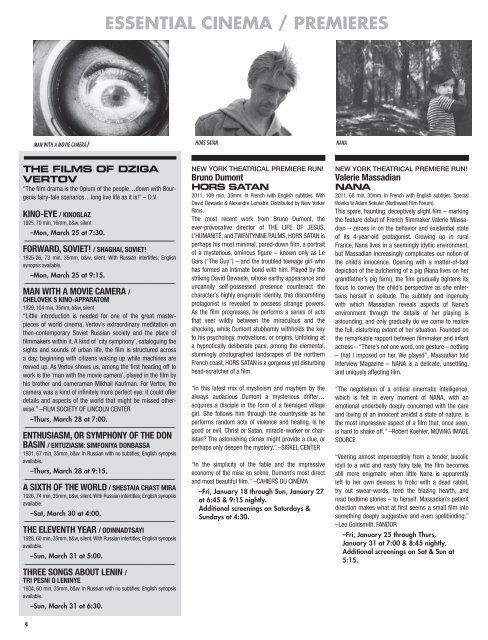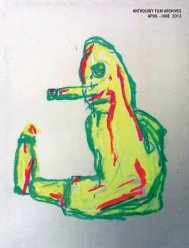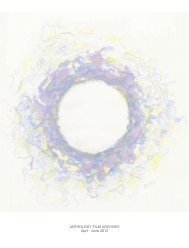quarterly pdf - Anthology Film Archives
quarterly pdf - Anthology Film Archives
quarterly pdf - Anthology Film Archives
Create successful ePaper yourself
Turn your PDF publications into a flip-book with our unique Google optimized e-Paper software.
4<br />
MAN WITH A MOVIE CAMERA /<br />
THE FILMS OF DZIGA<br />
VERTOV<br />
“The film drama is the Opium of the people…down with Bourgeois<br />
fairy-tale scenarios…long live life as it is!” – D.V.<br />
KINO-EYE / KINOGLAZ<br />
1925, 70 min, 16mm, b&w, silent<br />
–Mon, March 25 at 7:30.<br />
––––––––––––––––––––––––––––––––––––––––––––––––––––––––––––––––––––––––––––––––––––––––––––––––––––––––––––––<br />
FORWARD, SOVIET! / SHAGHAI, SOVIET!<br />
1925-26, 73 min, 35mm, b&w, silent. With Russian intertitles; English<br />
synopsis available.<br />
–Mon, March 25 at 9:15.<br />
––––––––––––––––––––––––––––––––––––––––––––––––––––––––––––––––––––––––––––––––––––––––––––––––––––––––––––––<br />
MAN WITH A MOVIE CAMERA /<br />
CHELOVEK S KINO-APPARATOM<br />
1929, 104 min, 35mm, b&w, silent<br />
“Little introduction is needed for one of the great masterpieces<br />
of world cinema, Vertov’s extraordinary meditation on<br />
then-contemporary Soviet Russian society and the place of<br />
filmmakers within it. A kind of ‘city symphony’, cataloguing the<br />
sights and sounds of urban life, the film is structured across<br />
a day, beginning with citizens waking up while machines are<br />
revved up. As Vertov shows us, among the first heading off to<br />
work is the ‘man with the movie camera’, played in the film by<br />
his brother and cameraman Mikhail Kaufman. For Vertov, the<br />
camera was a kind of infinitely more perfect eye: it could offer<br />
details and aspects of the world that might be missed otherwise.”<br />
–FILM SOCIETY OF LINCOLN CENTER<br />
–Thurs, March 28 at 7:00.<br />
––––––––––––––––––––––––––––––––––––––––––––––––––––––––––––––––––––––––––––––––––––––––––––––––––––––––––––––<br />
ENTHUSIASM, OR SYMPHONY OF THE DON<br />
BASIN / ENTUZIASM: SIMFONIYA DONBASSA<br />
1931, 67 min, 35mm, b&w. In Russian with no subtitles; English synopsis<br />
available.<br />
–Thurs, March 28 at 9:15.<br />
––––––––––––––––––––––––––––––––––––––––––––––––––––––––––––––––––––––––––––––––––––––––––––––––––––––––––––––<br />
A SIXTH OF THE WORLD / SHESTAIA CHAST MIRA<br />
1926, 74 min, 35mm, b&w, silent. With Russian intertitles; English synopsis<br />
available.<br />
–Sat, March 30 at 4:00.<br />
––––––––––––––––––––––––––––––––––––––––––––––––––––––––––––––––––––––––––––––––––––––––––––––––––––––––––––––<br />
THE ELEVENTH YEAR / ODINNADTSAYI<br />
1928, 60 min, 35mm, b&w, silent. With Russian intertitles; English synopsis<br />
available.<br />
–Sun, March 31 at 5:00.<br />
––––––––––––––––––––––––––––––––––––––––––––––––––––––––––––––––––––––––––––––––––––––––––––––––––––––––––––––<br />
THREE SONGS ABOUT LENIN /<br />
TRI PESNI O LENINYE<br />
1934, 60 min, 35mm, b&w. In Russian with no subtitles; English synopsis<br />
available.<br />
–Sun, March 31 at 6:30.<br />
ESSENTIAL CINEMA / PREMIERES<br />
HORS SATAN<br />
NEW YORK THEATRICAL PREMIERE RUN!<br />
Bruno Dumont<br />
HORS SATAN<br />
2011, 109 min, 35mm. In French with English subtitles. With<br />
David Dewaele & Alexandre Lematre. Distributed by New Yorker<br />
<strong>Film</strong>s.<br />
The most recent work from Bruno Dumont, the<br />
ever-provocative director of THE LIFE OF JESUS,<br />
L’HUMANITÉ, and TWENTYNINE PALMS, HORS SATAN is<br />
perhaps his most minimal, pared-down film, a portrait<br />
of a mysterious, ominous figure – known only as Le<br />
Gars (“The Guy”) – and the troubled teenage girl who<br />
has formed an intimate bond with him. Played by the<br />
striking David Dewaele, whose earthy appearance and<br />
uncannily self-possessed presence counteract the<br />
character’s highly enigmatic identity, this discomfiting<br />
protagonist is revealed to possess strange powers.<br />
As the film progresses, he performs a series of acts<br />
that veer wildly between the miraculous and the<br />
shocking, while Dumont stubbornly withholds the key<br />
to his psychology, motivations, or origins. Unfolding at<br />
a hypnotically deliberate pace, among the elemental,<br />
stunningly photographed landscapes of the northern<br />
French coast, HORS SATAN is a gorgeous yet disturbing<br />
head-scratcher of a film.<br />
“In this latest mix of mysticism and mayhem by the<br />
always audacious Dumont a mysterious drifter…<br />
acquires a disciple in the form of a teenaged village<br />
girl. She follows him through the countryside as he<br />
performs random acts of violence and healing. Is he<br />
good or evil, Christ or Satan, miracle-worker or charlatan?<br />
The astonishing climax might provide a clue, or<br />
perhaps only deepen the mystery.” –SISKEL CENTER<br />
“In the simplicity of the fable and the impressive<br />
economy of the mise en scène, Dumont’s most direct<br />
and most beautiful film.” –CAHIERS DU CINÉMA<br />
–Fri, January 18 through Sun, January 27<br />
at 6:45 & 9:15 nightly.<br />
Additional screenings on Saturdays &<br />
Sundays at 4:30.<br />
NANA<br />
NEW YORK THEATRICAL PREMIERE RUN!<br />
Valerie Massadian<br />
NANA<br />
2011, 68 min, 35mm. In French with English subtitles. Special<br />
thanks to Adam Sekuler (Northwest <strong>Film</strong> Forum).<br />
This spare, haunting, deceptively slight film – marking<br />
the feature debut of French filmmaker Valerie Massadian<br />
– zeroes in on the behavior and existential state<br />
of its 4-year-old protagonist. Growing up in rural<br />
France, Nana lives in a seemingly idyllic environment,<br />
but Massadian increasingly complicates our notion of<br />
the child’s innocence. Opening with a matter-of-fact<br />
depiction of the butchering of a pig (Nana lives on her<br />
grandfather’s pig farm), the film gradually tightens its<br />
focus to convey the child’s perspective as she entertains<br />
herself in solitude. The subtlety and ingenuity<br />
with which Massadian reveals aspects of Nana’s<br />
environment through the details of her playing is<br />
astounding, and only gradually do we come to realize<br />
the full, disturbing extent of her situation. Founded on<br />
the remarkable rapport between filmmaker and infant<br />
actress – “There’s not one word, one gesture – nothing<br />
– that I imposed on her. We played”, Massadian told<br />
Interview Magazine – NANA is a delicate, unsettling,<br />
and uniquely affecting film.<br />
“The negotiation of a critical cinematic intelligence,<br />
which is felt in every moment of NANA, with an<br />
emotional underbelly deeply concerned with the care<br />
and loving of an innocent amidst a state of nature, is<br />
the most impressive aspect of a film that, once seen,<br />
is hard to shake off.” –Robert Koehler, MOVING IMAGE<br />
SOURCE<br />
“Veering almost imperceptibly from a tender, bucolic<br />
idyll to a wild and nasty fairy tale, the film becomes<br />
still more enigmatic when little Nana is apparently<br />
left to her own devices to frolic with a dead rabbit,<br />
try out swear-words, tend the blazing hearth, and<br />
read bedtime stories – to herself. Massadian’s patient<br />
direction makes what at first seems a small film into<br />
something deeply suggestive and even spellbinding.”<br />
–Leo Goldsmith, FANDOR<br />
–Fri, January 25 through Thurs,<br />
January 31 at 7:00 & 8:45 nightly.<br />
Additional screenings on Sat & Sun at<br />
5:15.




